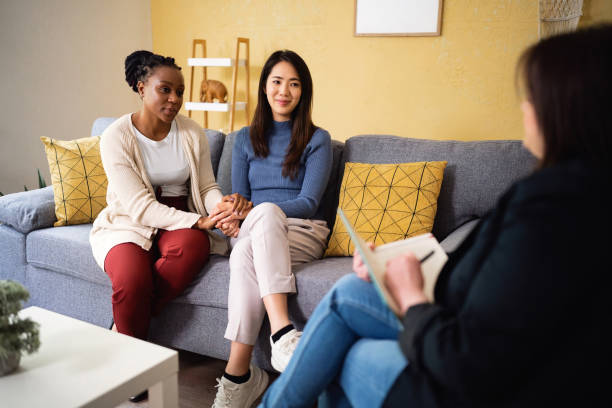“Is pre-marital counseling right for us?” It’s a question many engaged couples ask themselves as they prepare for marriage. While planning a wedding is exciting, planning for the marriage itself is even more important. Pre-marital counseling gives couples the opportunity to strengthen their foundation, address potential challenges, and build healthy habits that will support them for years to come. Sometimes, there is a fear that pre-marital counseling will uncover “reasons not to get married”. In reality, addressing potential hurdles before marriage can help to reduce their impact, or eliminate them altogether. Yes, there are some aspects of entering into a marriage that a couple can’t really compromise on. But avoiding those conversations won’t make those issues disappear.

What Is Pre-Marital Counseling?
Pre-marital counseling is a type of therapy designed to help couples prepare for marriage by exploring important areas of their relationship. It’s not about “fixing” problems—it’s about building understanding, communication, and trust before tying the knot. As a couples counselor in Woodland Hills, I see the benefits of pre-marital counseling in real time as couples navigate the time before their marriages begin.
Signs You Might Benefit from Pre-Marital Counseling:
- Communication struggles: Arguments escalate quickly, or you find it hard to discuss certain topics.
- Different expectations: You and your partner have differing views on money, kids, faith, or household roles.
- Unresolved past issues: Old resentments or trust issues linger and need to be addressed before marriage.
- Family dynamics: In-laws, cultural traditions, or family expectations feel overwhelming.
- Conflict avoidance: You tend to sweep disagreements under the rug instead of working through them.
- Simply wanting to prepare: You want tools to strengthen your bond, even if your relationship feels strong now.
2 Tools to Get the Most Out of Pre-Marital Counseling
1 – Be Open and Honest

Those who see us for couples therapy in Woodland Hills often relay that they struggle to be open and honest, for fear of hurting their partner’s feelings. They also find that they can misspeak when their emotions begin to take hold, often regretting the way something was communicated.
- Share your true thoughts, fears, and hopes during sessions. Many people focus on having to share the “tough stuff”, but there is a lot to be shared with your partner, including the positive. In couples therapy, some people learn for the first time how to communicate their affection for their partners, articulating what they are grateful for, the traits they appreciate, and more. Every aspect of the relationship is worth talking about, including what is working! Yes, you will also share your worries. Common fears include worrying that your partner will tire of you over time, or wondering if you’re truly ready for marriage, despite how much you want to be ready and how much you love your partner.
- Your therapist is invested in truly understanding what each of you are about. Avoid trying to “look perfect” as a couple—counseling works best when you’re both vulnerable and real. Couples therapy isn’t a secret test for compatibility, or contest to see who wins Couple of the Year. Every relationship has its own strengths and weaknesses, and a couples counselor will know and accept that. To get the most out of your sessions, being honest about who each of you are as individuals as well as how you interact as a pair is paramount. When you are open and honest and vulnerable, you can explore what works in the relationship, what is unclear in the relationship, and what will need attention and effort going forward. “Cheating” a couples therapy session is like going to the gym, sitting on a bench outside, and expecting to get stronger just because you showed up.
- Avoidance does not make problems disappear. We sometimes hope that if we are able to avoid having a conversation long enough, the reason for it will adjust or change in some way. We hope this because tough conversations can be difficult; we have to make ourselves vulnerable, we may need to bring up issues that we fear will hurt our partner, or that indicate issues in the foundation of the relationship. What actually helps to confront problems is to deal with them sooner rather than later. Remember: It’s better to have tough conversations now than let them grow into bigger conflicts later. A small issue that is dealt with can heal quite nicely; left to fester, it can become a bigger problem, one that spreads into other aspects of the relationship.
2 – Treat Counseling as Skill-Building

In our Woodland Hills Couples therapy sessions, we talk a lot about the skills necessary to embark upon a commitment like marriage. The great thing about these skills is that each person already has them in some capacity, because everyone has something they’re good at. Counseling helps to utilize those strong skills and strengthen the weaker ones so that you and your partner can form the kind of team you both dream of.
- There is nothing wrong with attending couples therapy. Think of pre-marital counseling like relationship training, not a sign of weakness. Do you expect to do everything perfectly at your job, without ever having to learn or practice any skills? Of course you don’t. In fact, the way you show that you are a skilled and dependable employee is by having the tools in place, upgrading your training when needed, owning up to mistakes, and being invested in collaboration? The quality of any relationship you have is not measured by how many things you can intuitively guess about your partner, or how many days you can go without having to help your partner better understand you, or vice versa. Anything worth doing, and especially anything you’re planning on doing for a while, will take skill building, practice, and refreshing.
- Couples therapy can help you and your partner to learn practical skills. No one grows up with the “perfect” modeling for life skills. Some people are raised in environments that are abundant in love, but not so great at boundaries. Others may have lots of practical skills taught to them, but nobody ever resolved emotional or interpersonal issues. And so on, and so on; everyone comes to a relationship with a different idea of what relationships are and how they function. Conflict resolution, financial planning, intimacy-building, and setting boundaries are all skills that are important for marriage, yet aren’t necessarily easy to develop. Being able to resolve conflicts with respect and invest in intimacy building can help with keeping the spark alive over time. Financial planning and setting boundaries can help each partner feel safe and secure, which makes it easier to open up and connect. So many of these skills overlap with one another, or contribute to one another.
- Progress doesn’t stop outside your therapy appointments. Apply what you learn outside sessions to make the tools part of your daily life. Hit pause at home during conversations when you need to consider what the most effective way is to communicate what you’re feeling. Choose low-stakes moments to apply what you have learned, such as being honest about something small that you might have just let go in the past. Make a conscientious effort to dial in when your partner is speaking; consider if you can really give them your full attention at that time, if you’re comfortable half-listening if not. Practice your communication skills with everyone around you, such as friends, family, and colleagues. Of course, you won’t be having the same kinds of conversations with them as you do with your partner. But you will find that all interpersonal relationships benefit from applying these tools.
Key Takeaways

- Pre-marital counseling is about preparation, not perfection. For example, if a couple is already feeling pressure from each other’s parents, they can determine how they will address some of the demands that may come up in the future. It won’t ensure that in-laws don’t push boundaries, but it will lay out the groundwork to be a united front at the time.
- It can help couples strengthen communication, clarify expectations, and address challenges early. Most problems can be overcome with open and respectful communication. Some can even be avoided altogether.
- Even couples with healthy relationships benefit from learning tools for long-term success. As life goes on and people grow and change, so do relationships. There is no reason to pressure yourself to “have it all figured out” by a certain point, and then never expect to do any maintenance work again.
- Those who attend in-person or online couples therapy learn to develop and improve communication skills that foster healthy relationship dynamics. Communication styles and preferences can be addressed, and adapted to, in a safe environment.
How Therapy Can Help
A therapist provides a safe, supportive space for couples to explore sensitive topics and build a stronger foundation for marriage. With guidance, you’ll leave pre-marital counseling not just with insight into your relationship, but also with practical tools to grow together through life’s challenges.
Couples Therapy In Woodland Hills
By the time many couples seek marriage counseling, they’re feeling emotionally drained—struggling with unresolved issues, broken trust, or a loss of connection. If this sounds familiar, you’re not alone. Our Gottman-trained couples therapists in Woodland Hills are here to support you. Through therapy, we’ll help you and your partner identify the strengths and challenges in your relationship and build the skills needed to improve communication, foster emotional vulnerability, and reconnect with one another.Contact us today for your complimentary 20-minute phone consultation with our Admin Team today!



